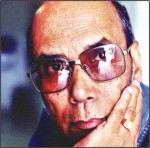The illustrious career of a playwright
In conversation with Syed Shamsul Haq
Ershad Kamol
Poet, dramatist and novelist Syed Shamul Haq is also one of the major playwrights of Bangla literature. Since his first play, Payer Awaaj Paowa Jaye he has blazed a distinctive trail. Plays by him including Nurul Diner Shara Jibon, Irsha, Khatta Tamasha, Juddho Ebong Juddho and others are considered as some of the most prolific plays in our neo-theatre movement. So far he has written 15 original plays, three translations of Shakespeare plays and two adaptations. In Haq's own words, "My translation of Shakespeare's Troilus and Cressida will be directed by Ataur Rahman for Nagorik Natyasampradaya. Ramendu Majumdar will direct my play Krishnapakkho for his troupe, Theatre. Aly Zaker and Sara Zaker will direct two plays, Shesh Joddha and Naarigon, respectively for Nagorik. I'm currently working on another script, which I will give to Nasiruddin Yousuff." Syed Shamsul Haq's plays deal with the universal human aspiration to be liberated. "Through the ages human beings have suffered captivity, created by the faulty structuralism of society," to quote Haq. "I don't like my scripts to be labelled. A play may have different messages. All major playwrights in the world who have written plays that contain universal relevance, have dealt with the issue of freedom. My intention is also to write universal plays." What is the secret of his success as a playwright? "It is impossible for a creative person to pinpoint any particular secret. In most of the cases it's the urge within that compels one to do something creative. I have written plays -- both in lyrical and prose forms, as well as combining the two. As the 'verse' form is a part of our tradition, I prefer to employ it and I've also written prose-drama. It is the theme and message of the play that guide my choice of form. I can safely say that when I wish to stir the sentiments of the audience, I prefer the verse form and when I want to raise questions I prefer the prose form," continues Haq, "And craftsmanship is very important for a play. The contemporary 'rhythm of the speech' should be reflected in the dialogue diction." Haq does not want to restrict his creativity to a particular tradition of a region; rather he prefers traditions of the world. He says, "Blending of cultures is a continuous process. I like to take elements from all over the world. I firmly believe that sticking to a particular tradition makes a style stagnant. And I consider those 'cultural fundamentalists', who cannot produce quality works due to ethnocentrism. For example, 'narrative' is one of our traditional styles, but I believe it should not be the only form. Those who believe that it should be the only style of 'Bangla theatre' are making our culture stagnant." Over the years several playwrights have translated and adapted foreign plays. At the forefront is Haq. His translation of Shakespeare's Macbeth and Tempest and the adaptation of Ariel Dorfman's Death and the Maiden, titled Mukhosh are among the most successful theatre productions. Which aspects should a translator or adaptor concentrate on? Haq responds, "First of all it should be easily communicative. Moreover, the translator or adapter must have the 'space sense' of theatre. Otherwise, it can be a quality translation but won't necessarily be quality theatre. Whatever I write -- original play or translation -- I visualise the whole play first. I believe in strong texts. I don't allow anyone to adulterate my text." What does he like to be called -- poet, playwright or novelist? Haq's preference: "Poet." "A poet is a master of all creative writing." So far, Syed Shamsul Haq has won all the major awards of the country including Ekushey Padak, Swadhinata Padak, Bangla Academy Padak and others. Moreover, a scholar of Department of Bangla, Rajshahi University has done a PhD on Haque's works.
|

Photo: Nasir Ali Mamun |